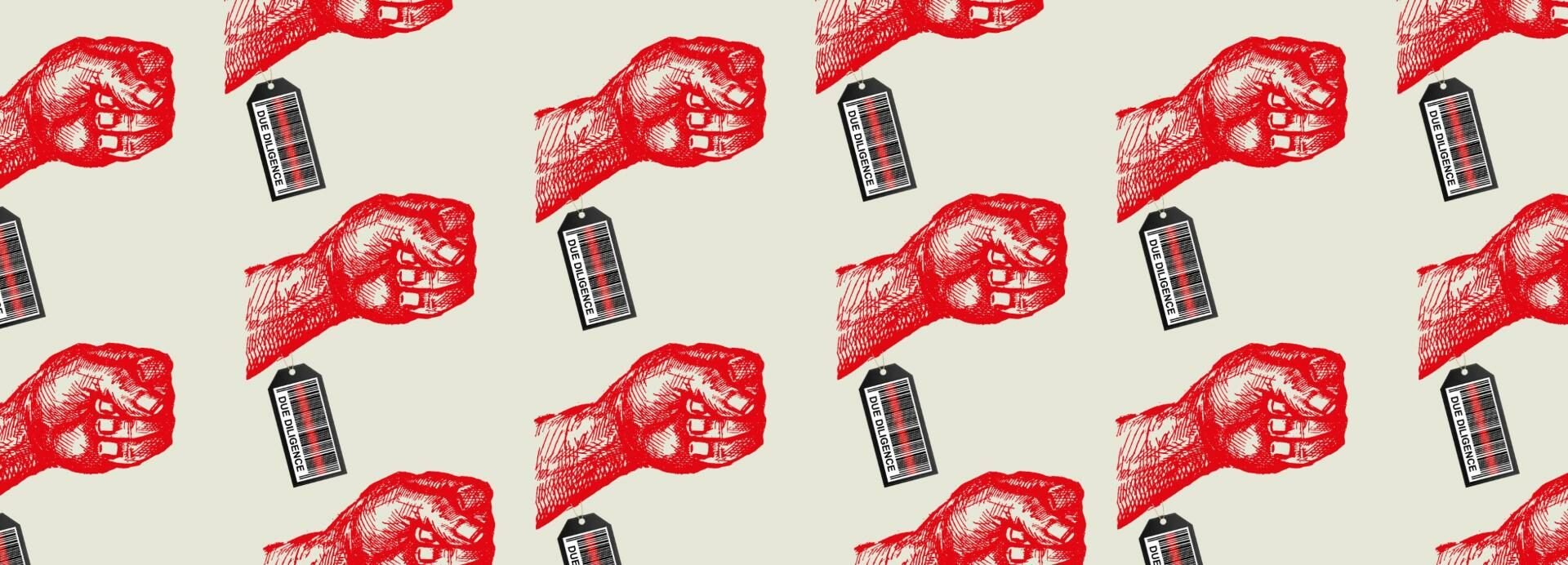
Major brands sourcing from China lack public policies on responsible exit
New research by SOMO and CLB into the policies of 20 leading electronics and apparel brands highlights concerning gaps in their commitment to human rights due diligence, particularly in addressing the impact on workers when changing or ending supplier relationships. While apparel companies generally perform better than electronics brands in disclosing responsible exit policies, many are still vague and offer minimal details on how these policies are implemented.
The tech sector in particular lags behind. Major tech companies such as Amazon, Microsoft, and Apple do not appear to have any clear policies on responsible exit, although changes in the supplier relationships of these companies can impact thousands of workers.
The importance of responsible exit (or responsible disengagement) policies and purchasing practices(opens in new window) has received considerable attention in recent years, particularly after the Covid pandemic saw large numbers of workers across supply chains lose their jobs, pay and rights when multinational companies terminated supply chain agreements with little notice and no provisions in place to prevent workers, and particularly those in low-paid jobs, from losing out on legally mandated severance pay and notice.
These research findings emphasise the urgent need for stronger due diligence practices, including responsible exit policies, to safeguard labour rights across both sectors.
Worker impacts after factory closures and relocations
Global supply chains are undergoing a major restructuring, leading to factories – especially in China -shutting down or relocating, significantly impacting workers. Research by SOMO and China Labour Bulletin has found that changes in the sourcing practices of international apparel and electronics brands have significantly contributed to labour rights abuses in supplying factories. Key factors driving their exit from China include rising labour costs, lessons from the COVID-19 pandemic highlighting the risks of supply chain concentration, U.S. tariffs on Chinese imports, and increasing geopolitical tensions.
As more companies attempt to reduce their reliance on Chinese suppliers, factory workers face wage arrears, withheld benefits, and unpaid compensation for contract termination. As this is a wider trend within and across sectors, the cumulative impact on workers is significant. Addressing the foreseeable impacts of sourcing decisions on workers is a key aspect of the corporate responsibility to respect human rights.
Disappointing due diligence track record
Research into the steps appareland electronics companies take to protect workers’ rights when reducing orders or terminating supplier relationships yields disappointing results. As part of their human rights due diligence, companies must publicly disclose the actions they take to prevent, mitigate, or remediate any harms caused, ensuring transparency and accountability. The review of 20 leading companies in these sectors, including several big tech brands, focused on the public availability of human rights due diligence policies related to responsible exit.
Key findings

Only 8 out of the 20 companies surveyed publicly disclosed policies. All of these were in the apparel sector. None of the electronics companies, including major players such as Amazon, SONY, Panasonic, LG, Microsoft, Apple, Dell, Samsung, and Nokia, publicly disclose any policies on responsible exit.
In the apparel sector, 20% of the companies assessed also failed to disclose responsible exit policies. For those that did share policies, critical details about concrete implementation steps, such as for example timelines or operating protocols, were typically missing. This was the case for companies such as Marks & Spencer and Nike. Of all companies reviewed, Adidas is most transparent about its responsible exit policy. In addition to its responsible sourcing & purchasing policy, the company has disclosed operating procedures when terminating a business relationship and guidelines regarding redundancy and layoffs.
Before publication, SOMO wrote to all the companies reviewed, offering them the opportunity to provide additional information relevant to our assessment. Sixteen companies responded.1
Amazon asked for three more weeks, in addition to the two weeks already offered, to “review the details” of our request. For a company that claims to be committed to enabling safe, equitable, fair, and sustainable supply chains and improving worker conditions, requesting such a long response time only to say whether it has responsible exit policies in place raises questions, not least about how accessible the company’s policies are to its staff. The United Nations Guiding Principles on Business and Human Rights, to which Amazon claims it adheres, clearly states that human rights policy should be “publicly available and communicated internally and externally to all personnel, business partners and other relevant parties”.2
Eight companies (Apple, HP, LG Electronics, Microsoft, Nokia, Panasonic, Samsung, Sony) referred SOMO to general policies on supply chain management or responsible business conduct, but did not share any additional, specific information on responsible exit.
VF Corporation which includes brands such as Timberland and The North Face, published a policy on responsible exit following our request for information.
Some companies told us that they are in the process of considering greater transparency around their human rights due diligence efforts. Nokia, for example, which currently does not have a publicly disclosed policy on responsible exit, said that the company is “reviewing the possibility to further increase transparency in terms of what we publish.” Microsoft corporation told SOMO it is “continuing to evolve our programs at Microsoft and are beginning our programming efforts towards responsible exit using a risk-based approach, aligned with the requirements of global laws such as EU CSDDD.” Microsoft expects to share its progress publicly in 2025.
While it is positive that companies are moving towards greater transparency on the steps they take to protect workers in their supply chains when exiting or changing a supplier relationship, it is important that companies live up to the requirement to “know and show” they respect human rights. If policies and relevant procedures are not publicly available, it makes it hard for workers and their representatives to use them.

Robust due diligence policies must include provisions on responsible exit
Companies deciding to exit a supplier relationship, for whatever reasons, must conduct robust due diligence to identify and mitigate any potential harm to workers’ rights caused by these decisions. This expectation is related to, but not the same as, the responsibility of companies to exit a supplier that is non-compliant with regulations or codes of conduct.
Companies should disclose and implement clear, appropriate policies and processes outlining the steps to ensure responsible exit. This includes providing adequate time for all stakeholders to make informed decisions and ensuring workers are paid all wages and benefits owed before a sourcing relationship ends. Companies must also consult meaningfully with workers to identify potential risks and impacts before fully disengaging; they should ensure that workers are paid their full wages, benefits, and compensation, especially during restructuring or closure.
Furthermore, companies must collaborate with state entities to address any challenges workers face due to the exit and take measures to remediate any adverse impacts, in addition to publicly disclosing the actions taken to prevent, mitigate, or remediate any harm caused.
1 Of the twenty companies that were offered a right of reply, four companies (C&A, Dell, Marks & Spencer and Under Armour) did not respond.
2 UNGPs, Principle 16, available at: https://www.ohchr.org/sites/default/files/documents/publications/guidingprinciplesbusinesshr_en.pdfDo you need more information?
-

Joshua Rosenzweig
Senior Advisor on Business and Human Rights & China -

Virginia Sandjojo
Senior Policy and Advocacy Officer
Related news
-
Chain of consequences Published on:
 Joshua RosenzweigPosted in category:Publication
Joshua RosenzweigPosted in category:Publication Joshua Rosenzweig
Joshua Rosenzweig
-

-
 Urgent need for EU legislative action to keep European surveillance tech out of IranPosted in category:News
Urgent need for EU legislative action to keep European surveillance tech out of IranPosted in category:News Joseph Wilde-RamsingPublished on:
Joseph Wilde-RamsingPublished on:



